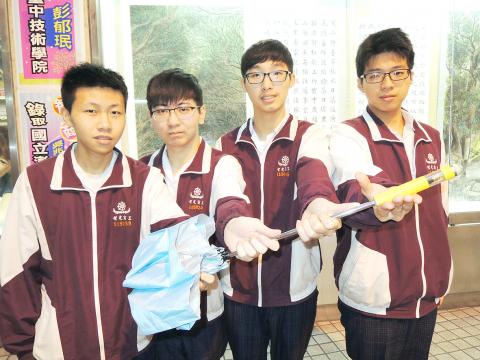Inspired by the stabbing rampage on Taipei’s MRT system last year, students in Chih-Kwang Senior Vocational Business and Technology High School’s multimedia department came up with the idea of turning an umbrella into a weapon of self-defense by placing a can of mace in the handle.
During a graduation exhibition on Monday, students at the New Taipei City school said they have developed a “multipurpose defensive umbrella.”
Student Fei Chun-chi (斐俊期) said that many people have been scared of taking the MRT since last year’s stabbing rampage, and that most MRT riders are not equipped to defend themselves against potential assailants. Fei said the students’ goal was to equip everyday items with defensive capabilities.

Photo: Weng Yu-huang, Taipei Times
Student Huang Ssu-kai (黃思凱) said the group had originally thought of hiding a cone-shaped blade in an umbrella handle to “combat violence with violence,” but MRT regulations bar passengers from carrying weapons.
As the goal was to deter an assailant, not to cause further harm, the students thought of making an umbrella handle into an extendable baton, Huang said.
However, if the user was under stress, they might fumble and not be able to extend the baton, he said.
After some more brainstorming, the students came up with the idea of mace spray that would allow users to fend off an assailant’s advances with the umbrella itself, as well as using the mace to disorient the attacker and buy time for police officers to arrive, Huang said.
The students said they were looking to strengthen the umbrella’s fabric as well as reinforce its frame, while keeping an eye on its total weight.
“We hope to produce something that will truly combine the utility of an umbrella while meeting the need for a self-defense tool,” the group said.
Four people were killed and more than a score injured on May 21 last year when 21-year-old Cheng Chieh (鄭捷) began stabbing other MRT passengers as their train traveled from Jiangzicui Station to Longshan Temple Station.

TRAFFIC SAFETY RULES: A positive result in a drug test would result in a two-year license suspension for the driver and vehicle, and a fine of up to NT$180,000 The Ministry of Transportation and Communications is to authorize police to conduct roadside saliva tests by the end of the year to deter people from driving while under the influence of narcotics, it said yesterday. The ministry last month unveiled a draft of amended regulations governing traffic safety rules and penalties, which included provisions empowering police to conduct mandatory saliva tests on drivers. While currently rules authorize police to use oral fluid testing kits for signs of drug use, they do not establish penalties for noncompliance or operating procedures for officers to follow, the ministry said. The proposed changes to the regulations require

The Executive Yuan yesterday announced that registration for a one-time universal NT$10,000 cash handout to help people in Taiwan survive US tariffs and inflation would start on Nov. 5, with payouts available as early as Nov. 12. Who is eligible for the handout? Registered Taiwanese nationals are eligible, including those born in Taiwan before April 30 next year with a birth certificate. Non-registered nationals with residence permits, foreign permanent residents and foreign spouses of Taiwanese citizens with residence permits also qualify for the handouts. For people who meet the eligibility requirements, but passed away between yesterday and April 30 next year, surviving family members

China Airlines Ltd (CAL) yesterday morning joined SkyTeam’s Aviation Challenge for the fourth time, operating a demonstration flight for “net zero carbon emissions” from Taiwan Taoyuan International Airport to Bangkok. The flight used sustainable aviation fuel (SAF) at a ratio of up to 40 percent, the highest proportion CAL has achieved to date, the nation’s largest carrier said. Since April, SAF has become available to Taiwanese international carriers at Taipei International Airport (Songshan airport), Kaohsiung International Airport and Taoyuan airport. In previous challenges, CAL operated “net zero carbon emission flights” to Singapore and Japan. At a ceremony at Taoyuan airport, China Airlines chief sustainability

‘ONE CHINA’: A statement that Berlin decides its own China policy did not seem to sit well with Beijing, which offered only one meeting with the German official German Minister for Foreign Affairs Johann Wadephul’s trip to China has been canceled, a spokesperson for his ministry said yesterday, amid rising tensions between the two nations, including over Taiwan. Wadephul had planned to address Chinese curbs on rare earths during his visit, but his comments about Berlin deciding on the “design” of its “one China” policy ahead of the trip appear to have rankled China. Asked about Wadephul’s comments, Chinese Ministry of Foreign Affairs spokesman Guo Jiakun (郭嘉昆) said the “one China principle” has “no room for any self-definition.” In the interview published on Thursday, Wadephul said he would urge China to